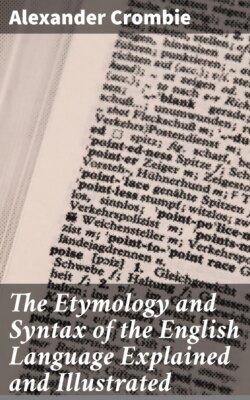Читать книгу The Etymology and Syntax of the English Language Explained and Illustrated - Alexander Crombie - Страница 4
На сайте Литреса книга снята с продажи.
ОглавлениеPART I.
ETYMOLOGY.
Table of Contents
OF WORDS IN GENERAL, AND THE PARTS OF SPEECH.
A word, in oral language, is either a significant simple sound, or a significant combination of sounds. In written language, it may be defined to be a simple character, or combination of characters, expressive of significant sounds, simple or compound.
A word of one syllable is called a monosyllable; of two syllables, a dissyllable; a word of three syllables, a trisyllable; and a word of more than three syllables is called a polysyllable. The last term, however, is frequently applied to words exceeding two syllables.
Words are either derivative or primitive.
A primitive is that which is formed from no other word, being itself a root, whence others spring, as angel, spirit, school.
A derivative is that which is derived from some other word, as angelic, spiritual, scholar.
A compound is a word made up of two or more words, as archangel, spiritless, schoolman.
In examining the character of words as significant of ideas, we find them reducible into classes, or denominations, according to the offices which they severally perform. These classes are generally called parts of speech; and how many of these belong to language has long been a question among philosophers and grammarians. Some have reckoned two, some three, and others four; while the generality have affirmed, that there are not fewer than eight, nine, or ten[7]. This strange diversity of opinion has partly arisen from a propensity to judge of the character of words more from their form, which is a most fallacious criterion, than from their import or signification. One thing appears certain, how much soever the subject may have been obscured by scholastic refinements, that to assign names to objects of thought, and to express their properties and qualities, are the only indispensable requisites in language. If this be admitted, it follows, that the noun and the verb are the only parts of speech which are essentially necessary; the former being the name of the thing of which we speak, and the latter, verb, (or the word, by way of eminence,) expressing what we think of it[8]. All other sorts of words must be regarded as subsidiaries, convenient perhaps for the more easy communication of thought, but by no means indispensably requisite.
Had we a distinct name for every individual object of sensation or thought, language would then be composed purely of proper names, and thus become too great a load for any memory to retain. Language, therefore, must be composed of general signs, that it may be remembered; and as all our sensations and perceptions are of single objects, it must also be capable of denoting individuals. Now, whatever mode be adopted to render general terms significant of individual objects, or whatever auxiliaries be employed for this purpose, the general term, with its individuating word, must be regarded as a substitute for the proper name. Thus man is a general term to denote the whole of a species; if I say, the man, this man, that man, it is obvious that the words the, this, and that, termed definitives, serve, with the general term, as a substitute for the proper name of the individual.
Hence it is evident, that those words which are termed definitives, how useful soever, cannot be regarded as indispensable.
The pronoun is clearly a substitute for the noun: it cannot therefore be deemed essential. The adjective expressing merely the property or quality in concreto, without affirmation, may be dispensed with; the connexion of a substance with a quality or property being expressible by the noun and the verb. Thus, “a good man” is equivalent to “a man of, with, or having, goodness.” Adverbs, which have been termed attributes of the second order, are nothing but abbreviations, as, here, for in this place, bravely, for brave like. These, therefore, cannot be considered as essentials in language. In the same manner it might be shown, that all parts of speech, noun and verb excepted, are either substitutes or abbreviations, convenient indeed, but not indispensably requisite. But, as there will be occasion to illustrate this theory, when the generally received parts of speech are severally examined, it is unnecessary to enlarge on the subject at present.
Though the essential parts of speech in every language are only two, the noun and the verb; yet, as there is in all languages a number of words not strictly reducible to either of these primary divisions, it has been usual with grammarians to arrange words into a variety of different classes. This distribution is partly arbitrary, there being no definite or universally-received principle, by which to determine what discriminative circumstances are sufficient to entitle any species of words to the distinction of a separate order. Hence grammarians are not agreed concerning the number of these subordinate classes. But, into whatever number of denominations they may be distributed, it should be always remembered, that the only necessary parts of speech are noun and verb; every other species of words being admitted solely for despatch or ornament. The parts of speech in English may be reckoned ten: Noun, Article, Pronoun, Adjective, Verb, Participle, Adverb, Preposition, Conjunction, Interjection.
